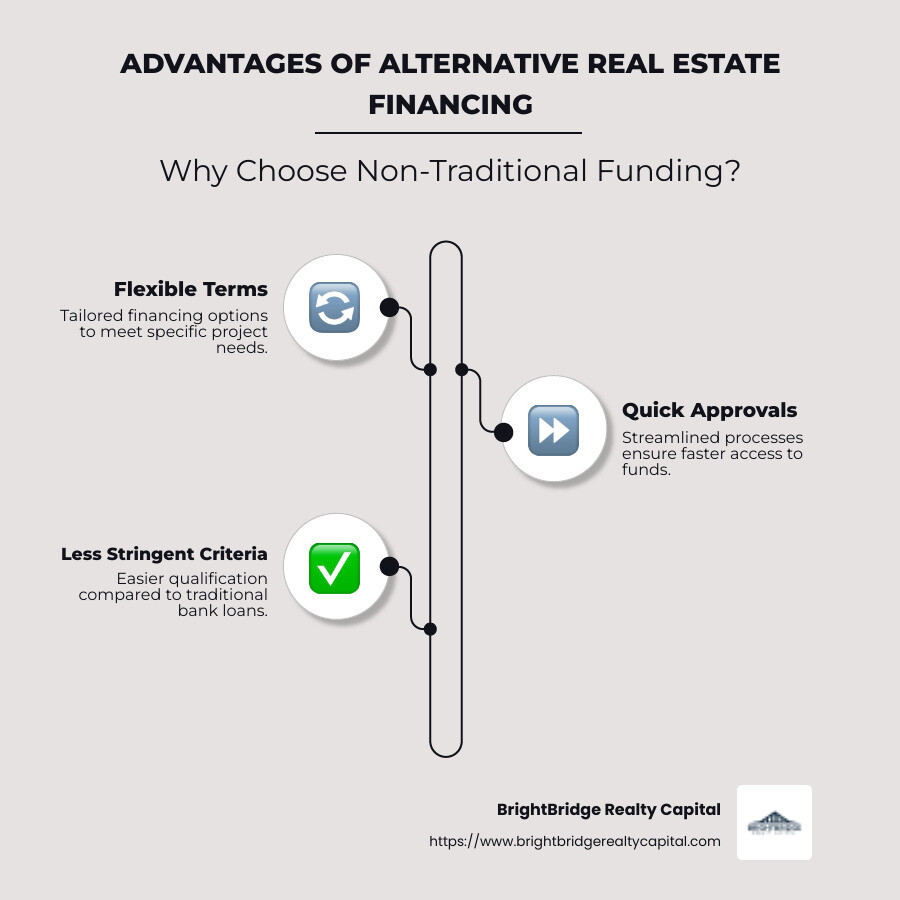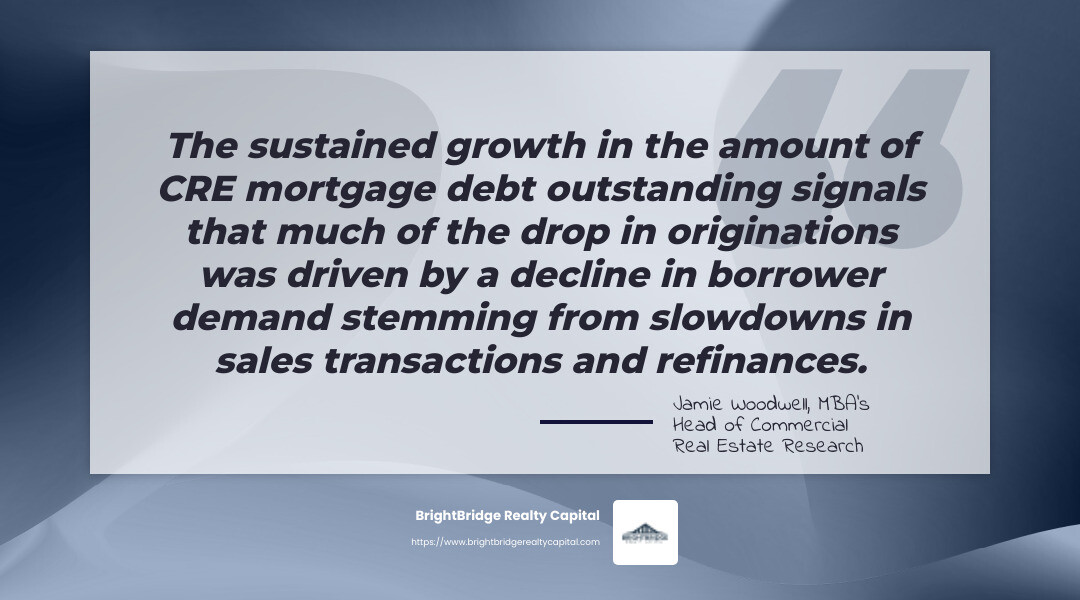Think Outside the Bank: Alternative Real Estate Financing Explained

Alternative real estate financing is rapidly emerging as a smart solution for investors seeking agility and flexibility in their property ventures. Whether you’re flipping a house in New York or expanding a rental portfolio, these non-traditional funding strategies can offer compelling benefits:
- Flexible terms
- Quick approvals
- Less stringent criteria
In today’s market, securing the right financing quickly can be crucial to seizing investment opportunities. Traditional bank loans often come with cumbersome processes and rigid requirements, making them less than ideal for those in need of fast solutions.
In contrast, alternative financing provides diverse options that cater to unique financial situations and investment goals. From bridge loans to private lending, these strategies empower investors with the agility they need to succeed.
“Investing in real estate is never a bad idea. It offers a slew of financial and personal benefits, such as increased cash flow, home appreciation, and tax benefits.” – Fortune Builders
Explore the potential of alternative real estate financing and find how it can be a game-changer for your investment strategies.

Related content about alternative real estate financing:
Understanding Alternative Real Estate Financing
Alternative real estate financing is all about breaking away from the traditional bank loan model. It's about finding flexible, quick solutions that match the nature of today's real estate market.
Non-Traditional Funding
When traditional bank loans can be slow and cumbersome, non-traditional funding offers a refreshing alternative. These methods include options like bridge loans, hard money loans, and private money lenders. They bypass the red tape of conventional bank loans, allowing investors to move quickly and decisively.

Flexible Solutions
The beauty of alternative financing lies in its flexibility. Unlike traditional loans, which often come with strict terms and conditions, alternative options can be custom to fit the unique needs of the investor. Whether you're looking for short-term capital to flip a property or long-term funding to expand your rental portfolio, there's likely an alternative solution that fits your strategy.
Quick Funding
Time is of the essence in real estate. Opportunities can come and go in the blink of an eye. That's why quick funding options are so valuable. Alternative financing methods often offer faster approval processes and can provide the funds you need in a fraction of the time it takes to secure a traditional loan. This speed can be the difference between snagging a great deal or watching it pass by.

By understanding and utilizing alternative real estate financing, investors can gain the agility needed to thrive in a competitive market. Whether you're an experienced investor or just starting out, exploring these non-traditional funding avenues can open up new possibilities for your real estate ventures.
Types of Alternative Real Estate Financing
When traditional bank loans aren't the right fit, alternative real estate financing steps in with a variety of options. Each type caters to different needs and situations, offering investors flexibility and speed. Let's break down the most common types:
Bridge Loans
Bridge loans are short-term solutions that help investors "bridge" the gap between transactions. Imagine you’ve found a great property deal but need to sell your current property first. A bridge loan can provide the necessary funds to secure your new investment while you finalize the sale of your existing asset.
These loans are known for their quick approval process. They usually come with higher interest rates but can be crucial for closing deals fast.
Hard Money Loans
Hard money loans are another fast, asset-focused financing option. They're perfect for investors looking to buy, renovate, and quickly sell a property. If a traditional lender is hesitant because of a property's condition, a hard money lender might see potential where others don't.
These loans focus more on the value of the property rather than the borrower's credit history. They offer a quick turnaround, often funding within days, which is ideal for time-sensitive investments.
Private Money Lenders
Private money lenders are individuals or groups who lend their own capital. This type of financing can be more flexible than institutional loans, as terms are often negotiable.
For instance, a private lender might be a family member or a business associate willing to fund your project based on a mutual agreement. These loans can vary widely in terms of interest rates and repayment schedules, making them a versatile option for many investors.
Seller Financing
Seller financing turns the seller into the lender, allowing the buyer to make payments directly to them. This can be a win-win for both parties, especially if the buyer struggles to qualify for a traditional loan.
While this option can speed up transactions, it does come with risks. Buyers might face potential default issues, and sellers must be prepared to handle the complexities of managing a loan.
Peer-to-Peer Lending
Peer-to-peer lending connects borrowers with individual investors through online platforms. This method cuts out traditional financial institutions, often resulting in more favorable terms for the borrower.
Investors can benefit from higher returns compared to traditional savings, while borrowers enjoy potentially lower interest rates and quicker access to funds. However, it's important to be aware of platform fees and the peer-to-peer model's relative newness in the market.
By exploring these alternative real estate financing options, investors can find the right fit for their unique needs and goals, enabling them to act swiftly and seize opportunities in the real estate market.
Benefits of Alternative Real Estate Financing
When it comes to real estate investments, alternative real estate financing offers several distinct advantages over traditional bank loans. These benefits can be game-changers for investors who need flexibility and speed.
Flexibility
One of the biggest perks of alternative real estate financing is its flexibility. Unlike conventional loans, which come with rigid terms and conditions, alternative options often allow for more customizable agreements. For instance, private money lenders and seller financing can offer custom repayment schedules that fit the investor's specific needs. This flexibility can be especially beneficial for those dealing with unique properties or unconventional investment strategies.
Quick Approval
Speed is often of the essence in real estate deals. Traditional bank loans can take weeks or even months to process, but alternative financing options like bridge loans and hard money loans are known for their rapid approval times. These loans can often be approved within days, allowing investors to act quickly and secure properties in competitive markets. This swift process can make a huge difference when trying to close a time-sensitive deal.
Less Stringent Criteria
Finally, alternative real estate financing typically involves less stringent criteria compared to traditional bank loans. Banks often require high credit scores and extensive financial documentation, which can be a barrier for many investors. In contrast, alternative lenders are more focused on the value of the property itself rather than the borrower's financial history. This opens doors for those who might not qualify for traditional financing, such as new investors or those with less-than-perfect credit.
By understanding these benefits, investors can make informed decisions that align with their financial situation and investment goals, enabling them to steer the real estate market with confidence and agility.
How to Choose the Right Alternative Financing Option
Picking the right alternative real estate financing option can feel like solving a puzzle. The key is to match the financing type with your project needs, financial situation, and investment goals. Here's how you can do it:
Assess Your Project Needs
First, think about what your project really requires. Are you flipping a house and need a short-term loan? Or are you buying a rental property that needs a steady cash flow? Bridge loans are great for short-term projects because they offer quick cash and have flexible terms. On the other hand, if you're looking to hold a property for a longer period, seller financing or private money lenders might be more suitable.
Understand Your Financial Situation
Your financial health is a big factor. If your credit score is less than stellar, traditional banks might not be an option. That's where alternative real estate financing shines. Options like hard money loans focus more on the property's value than your credit history. This can be a lifeline if you have a solid plan but need a bit of financial leeway.
Align with Your Investment Goals
Finally, make sure the financing aligns with your goals. If your aim is to build a portfolio quickly, peer-to-peer lending could offer the speed and flexibility you need. But if you're focused on long-term growth, consider options that provide stability and lower interest rates, like seller financing.
Choosing the right financing is all about understanding these elements. By aligning your project needs, financial situation, and goals, you can confidently select an alternative real estate financing option that paves the way for success.
Frequently Asked Questions about Alternative Real Estate Financing
What is alternative real estate financing?
Alternative real estate financing refers to non-traditional methods of funding real estate purchases. Unlike conventional bank loans, these options often provide more flexibility and faster approval times. They include methods like bridge loans, hard money loans, private money lenders, seller financing, and peer-to-peer lending. These alternatives are particularly useful for those who might not meet the strict criteria of traditional banks, such as first-time investors or those with a less-than-perfect credit history.
How does alternative financing differ from traditional bank loans?
The primary difference lies in the flexibility and speed of the approval process. Traditional bank loans typically require extensive documentation, a high credit score, and a longer approval period. In contrast, alternative real estate financing options often have less stringent criteria. For example, hard money loans focus on the property's value rather than the borrower's credit score. This makes them ideal for quick transactions, like purchasing a distressed property for renovation. Additionally, alternative options can offer customized loan structures that align better with specific project needs and timelines.
What are the risks associated with alternative real estate financing?
While alternative real estate financing offers many benefits, it also comes with certain risks. One of the main concerns is higher interest rates. For instance, hard money loans and bridge loans can have significantly higher rates compared to traditional mortgages. This can increase the overall cost of the loan. Additionally, these loans often have shorter terms, which means borrowers must repay them quickly or refinance under different terms. There's also the risk of less regulation, which can lead to less protection for the borrower. It's crucial to thoroughly understand the terms and conditions before proceeding with any alternative financing option.
Conclusion
As we wrap up our exploration of alternative real estate financing, it's clear that these options open up a world of possibilities for investors. At BrightBridge Realty Capital, we understand the unique needs of real estate investors and offer customized solutions to help you seize opportunities swiftly.
Our standout feature is our ability to provide fast closings, often within a week. This speed is crucial in a competitive market where timing can make all the difference. By eliminating intermediaries, we offer direct lending with competitive rates, ensuring a seamless and efficient process. Whether you're investing in a new property, flipping a home, or expanding your portfolio, our custom financing solutions are designed to fit your specific goals and needs.
Located in New York, NY, BrightBridge Realty Capital is committed to empowering your real estate ventures with the flexibility and speed you need to stay ahead.
Ready to explore how we can support your investment journey? Contact us today to find more about our innovative financing solutions.


